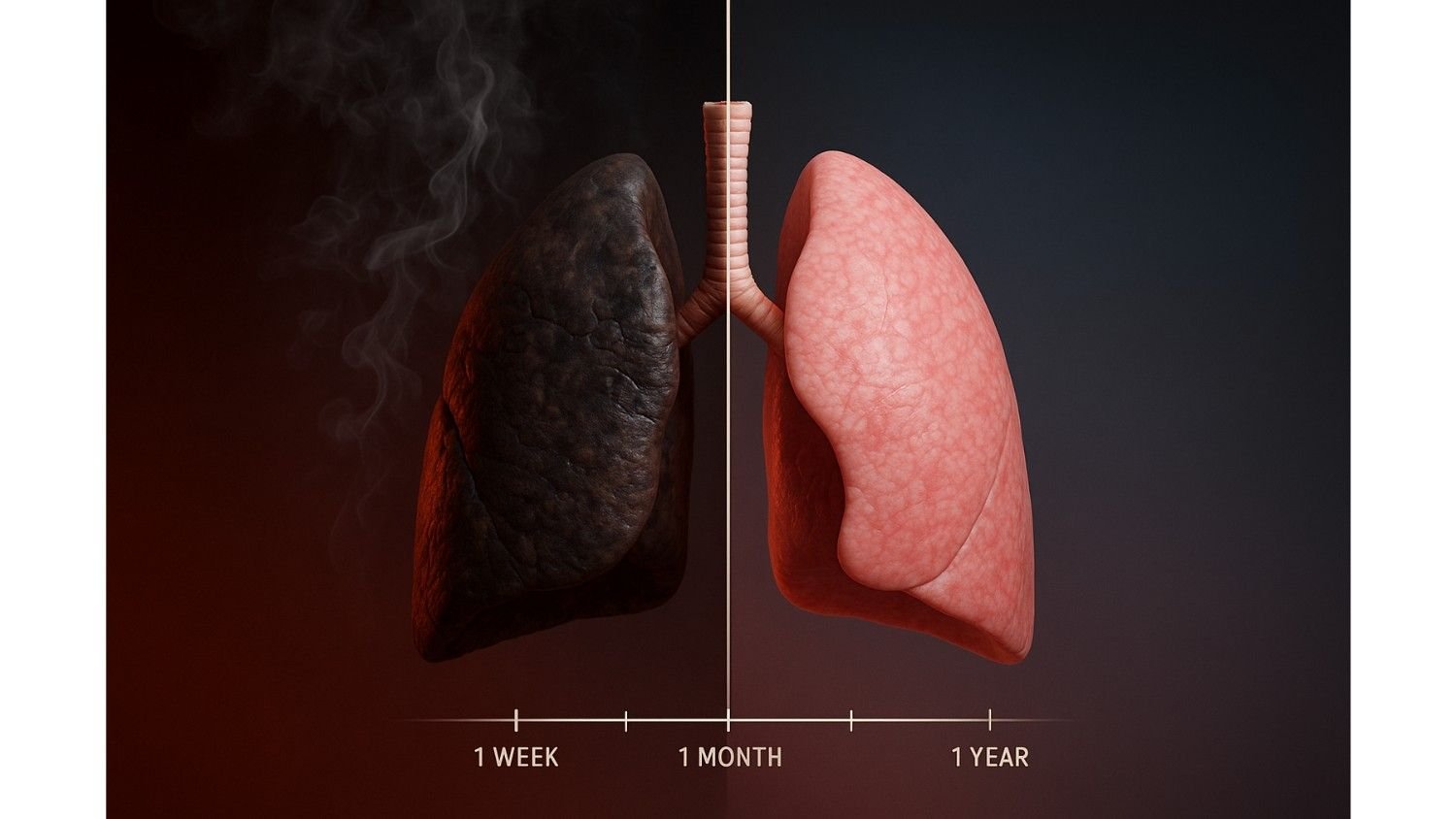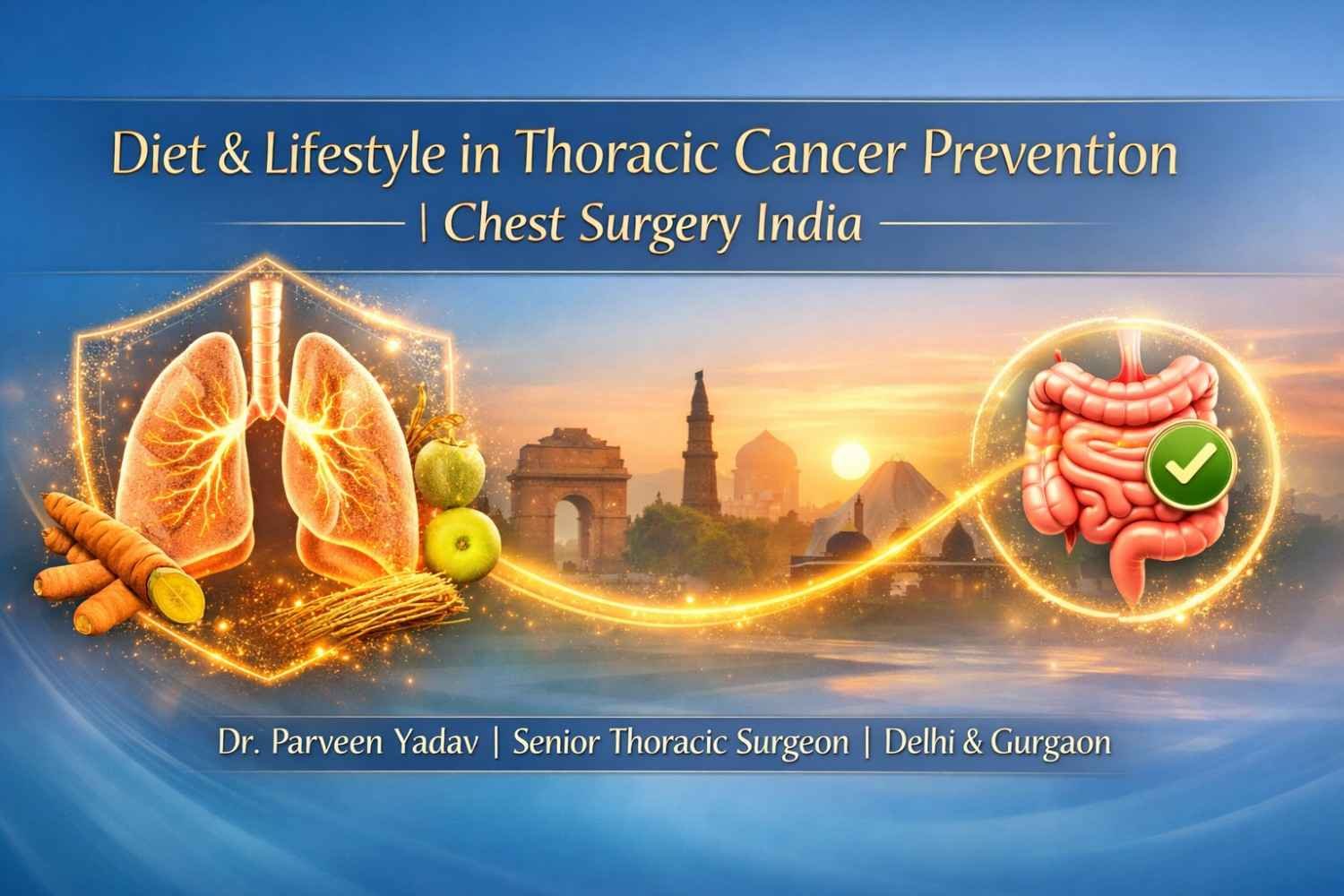

As a surgeon who provides lung cancer treatment in Gurgaon, I have seen the terrible effects of smoking up close. But I have also seen something amazing: the body’s power to heal itself. When you decide to quit smoking, you are taking the best possible step for your health. A healing process starts in your body just minutes after you put out your last cigarette.
Quitting is not just about stopping future harm. It is an active way to recover. Your body begins to repair itself right away, starting with your lungs. Over time, this greatly lowers your risk of getting cancer, heart disease, and other long-term illnesses.
Many patients I talk with feel it is “too late” to quit. They think the damage is already done. I am here to tell you that it is never too late. In this article, I will walk you through what happens when you stop smoking. You will see the amazing healing journey your body is ready to begin.
The first few days after you quit are usually the hardest. Your body is clearing out nicotine, and you might feel withdrawal symptoms. But this is also when the fastest and most encouraging changes happen. Think of these early benefits as your body’s way of saying thank you and telling you to keep going.
The healing starts almost right away. Nicotine makes your heart beat faster and raises your blood pressure. This puts a lot of stress on your heart and blood vessels.
Cigarette smoke has carbon monoxide in it. This is a dangerous gas that gets into your blood. It takes the place of oxygen, which means your organs do not get the oxygen they need to work well.
The chemicals in smoke can make it hard to taste and smell things. They damage the nerve endings in your nose and mouth. The good news is that these nerves heal quickly.
These real benefits—like food tasting better or breathing more easily—are strong reminders that your body is healing. They can give you the motivation you need to get through the hardest part of quitting.
After the first few days, your body starts making long-term repairs. The changes become even bigger, especially in your lungs and heart. By the end of the first year, your risk for serious diseases will have dropped a lot.
Many people get worried when they start coughing more after they quit. They think they are getting sick, but it is actually the opposite. This is one of the most misunderstood parts of quitting.
Your airways have tiny hairs called cilia. Think of them like tiny brooms. Their job is to sweep out mucus, which traps dust and germs. Smoking paralyzes and destroys these cilia. This is why people who smoke get sick more often.
When you quit, your cilia start to repair themselves and grow back within a few days. As they start working again, they begin the big job of cleaning out the tar and mucus that have been stuck in your lungs for years. This cleaning process is what causes the "quitter's cough." It is a good sign that your lungs are healing and cleaning themselves out. The cough might last for a few months, but it shows your body is getting healthier.
During this time, you will start to feel much better every day.
Making it to one year without smoking is a huge success. At this point, your extra risk of heart disease is cut by 50% compared to someone who still smokes. This is a powerful, proven fact that shows the amazing benefits of staying smoke-free.
This table shows the key health milestones you can look forward to.
Table 1: The Quitting Timeline - A Summary of Health Milestones
| Time Since Last Cigarette | Key Health Improvement |
| 20 Minutes | Your heart rate and blood pressure start to drop toward normal levels. |
| 12 Hours | The carbon monoxide level in your blood drops to normal, letting more oxygen flow. |
| 48 Hours | Damaged nerve endings for taste and smell begin to heal and regrow. |
| 72 Hours | The bronchial tubes in your lungs start to relax, which makes breathing easier. |
| 2 Weeks - 3 Months | Your circulation gets better, and your lung function can increase by up to 30%. |
| 1 - 9 Months | Cilia regrow in your lungs, improving their ability to clean out mucus. Coughing and shortness of breath decrease. |
| 1 Year | Your added risk of coronary heart disease is cut in half compared to a smoker's. |
| 5 Years | Your risk of stroke is reduced to that of a non-smoker. Your risk of cancers of the mouth, throat, esophagus, and bladder is cut in half. |
| 10 Years | Your risk of dying from lung cancer is about 50% less than a current smoker's. |
| 15 Years | Your risk of coronary heart disease is now the same as that of a person who has never smoked. |
The healing continues for many years after you quit. Your risk for the most serious smoking-related diseases will keep going down until it is almost the same as a person who has never smoked.
This long-term benefit is often the strongest reason for people to quit. While some lung damage can be permanent, quitting lets healthy cells start to replace the damaged ones in your airways. This greatly lowers your risk of cancer over time.
A common myth is that if you have been smoking for a long time, the damage is done and quitting will not help. This is completely wrong. Research shows that quitting at any age gives you huge health benefits. One major study found that quitting before age 40 reduces your risk of dying early from a smoking-related disease by 90%.
Even more important, quitting after a cancer diagnosis can make a big difference. Patients who quit smoking often respond better to treatment, have fewer problems, and can lower their risk of death from certain cancers by up to 40%. Quitting gives you a sense of control and lets you take an active part in your own recovery.
After 15 years without smoking, your heart and blood vessels have mostly recovered. Your risk of coronary heart disease is the same as someone who has never smoked. By 20 years, your risk of a heart attack or stroke is nearly the same as that of a person who has never smoked.
The rewards of quitting go far beyond preventing disease. They improve your daily life in many ways, including how you look, your mental health, and your finances.
Smoking narrows your blood vessels, which means your skin does not get enough oxygen and nutrients. This can make you look older and give your skin a dull color. When you quit, your circulation improves, and your skin starts to get what it needs. This helps slow down the aging process and gives your skin a healthier glow. The yellow stains on your fingers and teeth will also start to fade.
Many people think smoking helps them relax. But that calm feeling is mostly just relief from nicotine withdrawal. The cycle of craving nicotine and then satisfying it actually creates more stress and anxiety. Most experts agree that after you get through the first few weeks of quitting, you will feel less anxiety, depression, and stress. People who quit report having a better mood and a better quality of life compared to those who keep smoking.
Smoking is very expensive. When you quit, you give yourself an immediate pay raise that keeps growing. Let’s look at the numbers for our area. In Gurgaon and the Delhi NCR, a pack of a popular cigarette brand costs about ₹340 for 20 cigarettes. That is ₹17 for each cigarette.
Even if you only smoke 10 cigarettes a day, the savings are huge.
Table 2: Estimated Financial Savings for a Smoker in Gurgaon
(Based on a 10-cigarette/day habit at ₹17/cigarette)
| Time Period | Savings (₹) | What You Could Afford in Gurgaon |
| Per Week | ₹1,190 | Several meals at a restaurant or a week's worth of fresh produce |
| Per Month | ₹5,100 | A monthly payment on a new appliance or a weekend getaway |
| Per Year | ₹62,050 | A significant portion of an annual school fee or a new high-end laptop |
| Per 5 Years | ₹310,250 | A down payment for a car or a substantial investment |
| Per 10 Years | ₹620,500 | A large contribution towards a property down payment or funding higher education |
The decision to quit is yours, but you are not alone on this path. Millions of people have successfully quit before you.
Be ready for withdrawal symptoms. They are temporary signs that your body is healing. You might feel irritable, anxious, or have trouble concentrating. Cravings can be strong, but they usually only last for a few minutes. If you can get through each one, they will become weaker and happen less often.
There is no one right way to quit. The best method is the one that works for you.
This healing journey is the most important one you will ever take. You do not have to do it by yourself. If you are worried about your lung health, have a cough that will not go away, or just want expert advice, please seek help. For those who are concerned about a diagnosis or would like a Second Opinion for Chest & Lung Conditions, talking with a specialist can give you the answers and peace of mind you need.
(For more information on lung health and cancer prevention, you can explore our website, including our detailed guide to lung cancer treatment in Gurgaon.)
Quitting smoking is a process. There will be challenges, but with every smoke-free day, your body is working hard to heal. It is rewarding you with better health, more energy, and a brighter future.
Your body is ready to start this amazing transformation. The only question is, are you?
If you have concerns about your lung health or are looking for support on your journey to a smoke-free life, my team and I are here to help you.

18+ Yrs Exp | 5,700+ Thoracic & Robotic Cancer Surgeries
Dr. Parveen Yadav is a Director and Senior Consultant in Thoracic and Surgical Oncology, specializing in minimally invasive and robotic lung and esophageal surgeries, with advanced training from AIIMS and Tata Memorial Hospital.
View Full Profile Pain After Thoracic Surgery: Tips for Smooth Recovery
Pain After Thoracic Surgery: Tips for Smooth Recovery
 Diet & Lifestyle for Thoracic Cancer Prevention | Dr. Parveen Yadav
Diet & Lifestyle for Thoracic Cancer Prevention | Dr. Parveen Yadav
 Robotic Thoracic Surgery: How Da Vinci Technology is Revolutionizing Chest Procedures
Robotic Thoracic Surgery: How Da Vinci Technology is Revolutionizing Chest Procedures
Struggling with pain after chest surgery? Dr. Parveen Yadav shares expert recovery tips, causes of shoulder pain, PTPS signs, and what your discharge sheet won't tell you.
Discover how diet, breathing exercises & daily habits help prevent and recover from thoracic cancer. Expert insights from Dr. Parveen Yadav, Chest Surgery India
Discover how Da Vinci robotic surgery is transforming chest procedures in Gurgaon. Less pain, faster recovery & expert care by a certified thoracic surgeon
Copyright 2026 © Dr .Parveen Yadav all rights reserved.
Proudly Scaled by Public Media Solution!